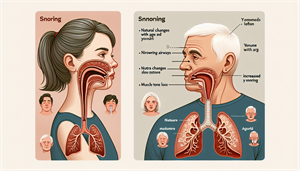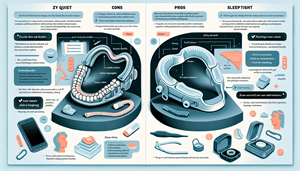
Why Are You More Likely to Snore with Age?
As the years pass, aging brings about a host of changes to your body, increasing your susceptibility to various health conditions. Among these changes, some are readily visible, like wrinkles and gray hair, while others are less conspicuous but equally impactful.
Unmasking the Age-Related Snore
Suddenly finding yourself snoring can be perplexing, especially if you've never experienced it before. The phenomenon of snoring is a manifestation of sleep-disordered breathing and can emerge at any stage of life. According to a study featured in American Family Physician, an examination of over 9,000 individuals aged 65 and above uncovered that more than half reported chronic sleep issues.
The implications of inadequate sleep can be profound and include:
- Elevated Risk of Falls: Disrupted sleep patterns increase the likelihood of accidents and falls, which can be particularly concerning for older adults.
- Impact on Systems: Sleep-disordered breathing can affect various bodily systems, including the pulmonary, cardiovascular, and central nervous systems, amplifying health risks.
- Hypertension and Sleep Apnea: Elderly individuals are more susceptible to conditions like hypertension and sleep apnea due to compromised sleep quality.
It's important to note that seniors generally experience shorter periods of sleep compared to younger counterparts. Frequent awakenings during the night and fragmented sleep-wake cycles become more prevalent as one ages.
Underlying Factors in Age-Related Snoring
Age-related snoring is often rooted in poor sleep practices. Irregular sleep schedules, early waking, and sporadic daytime napping can disrupt the body's natural sleep rhythm. While brief daytime naps might alleviate momentary fatigue, they can't replace the essential deep sleep cycles necessary for true rejuvenation.
Several other factors contribute to age-related snoring:
- Weight Gain: As metabolism changes with age, weight gain becomes more common. Increased weight can contribute to airway obstruction and subsequent snoring.
- Medications: Certain medications can relax throat muscles, leading to increased snoring tendencies.
- Caffeine and Stress: Elevated caffeine intake and heightened stress levels, often seen in older adults, can exacerbate snoring.
- Medical Conditions: Existing medical illnesses and psychiatric disorders can influence sleep patterns and contribute to snoring.
Dealing with Age-Related Snoring
While snoring might seem like an inevitable part of aging, it doesn't have to be. Addressing age-related snoring is essential for maintaining overall health and quality of life.
- Snoring Mouthpiece: Specially designed snoring mouthpieces can effectively curb snoring and improve sleep quality.
- Sleep Position: Sleeping on your side can prevent the relaxation of throat muscles that contribute to snoring.
- Lifestyle Adjustments: Limiting caffeine and alcohol intake, engaging in regular exercise, and maintaining a healthy weight can alleviate snoring tendencies.
- Seeking Professional Help: Consulting a healthcare professional can provide insights into underlying causes and personalized solutions.
In the grand tapestry of aging, snoring need not be an unwelcome thread. By understanding the factors at play and taking proactive steps, you can unravel the connection between age and snoring, promoting healthier and more restful nights.
Unlocking the Complex Relationship Between Age and Snoring
As the years advance, the human body undergoes a series of intricate changes, both internally and externally. While the most visible signs of aging often include graying hair and the emergence of fine lines, there are subtler shifts occurring within that can have profound effects on various aspects of our health – including sleep patterns and the onset of snoring.
Deciphering the Age-Related Snore
The sudden onset of sno


